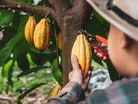Nestlé to work in Côte d'Ivoire to support cocoa industry

In collaboration between public and private sectors, several companies are aiming to protect the Cavally Forest which lies adjacent to cocoa production areas in Western Côte d'Ivoire. They aim to do this by working directly with local communities to achieve greater impact in the forest restoration project.
The collaboration includes the Swiss Federal Administration via the Swiss Platform for Sustainable Cocoa (SWISSCO), the Ivorian Ministry of Water and Forests (MINEF) and Nestlé, as well as Earthworm Foundation (EF). With the Ivorian government commencing efforts in 2020, the project is now welcoming new partners to achieve greater impact.
Nestlé: Unlocking the power of food through funding
Beginning on July 1, 2023, the new three-year phase of the project will have more ambitious goals and a wider group of partners. This includes the above companies, as well as Touton and Cocoasource, which work directly with cocoa and rubber cooperatives in the area affected.
This new collaboration follows in the footsteps of the initial, three-year project funded by Nestlé, which will run until the end of June 2023. Projects like these speak to the wider efforts by countries in Africa in 2023, whose heads of state are showing a commitment to improving food production potential in Africa.
During its first phase, the Cavally project led to a significant reduction in deforestation, the natural regeneration of 7000 hectares and the reforestation of almost 1500 hectares. In addition, greater economic and social resilience has been observed within local communities, with more than 1400 people benefiting financially from the project, according to Nestlé.
Cavally Forest is one of the last remaining dense forests in Côte d'Ivoire and is a primary biodiversity spot which is threatened by deforestation. The country has lost most of its forest cover over the last 60 years; between 1960 and 2021, the area of its forests shrunk from 16 million to 2.97 million hectares.
"The Cavally project is a very important initiative for us, as it allows our company to act directly within our supply chain. We are protecting a forest adjacent to the areas where we source cocoa and creating value for the farmers we work with," said Corinne Gabler, Head of Confectionery & Ice Cream at Nestlé.
"We're delighted to have been able to contribute towards the success of this first phase and look forward to working with new partners to further intensify the project's impact."



